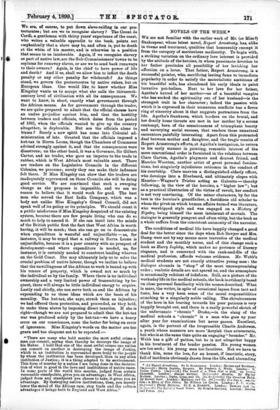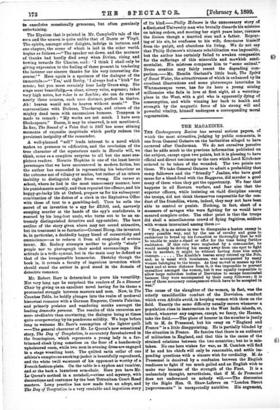NOVELS OP THE WEEK.*
WE are not familiar with the earlier work of Mr. (or Miss?) Shakespear, whose latest novel, Rupert Armstrong, has, alike in tbeme and treatment, qualities that honourably exempt it from the category of meritorious mediocrity. To begin with, a striking variation on the ordinary love interest is provided by the attitude of the heroine, in whom passionate devotion to her father precludes all possibility of her lavishing her affection on a lover. That father, Rupert Armstrong, is a successful painter, who, sacrificing lasting fame to immediate popularity in order to satisfy the materialistic ambitions of his beautiful wife, has abandoned his early ideals to paint lucrative pot-boilers. Next to her love for her father, Agatha's hatred of her mother—as of a beautiful vampire who has sucked the spirituality oat of her husband—is the strongest trait in her character ; indeed the passion with which it is expressed in their numerous conflicts has a fierce ring of sincerity about it that suggests portraiture from the life. Agatha's frankness, which borders on the brutal, and her deadly home thrusts are met in her mother by a serene contempt, born of the consciousness of triumphant beauty and unvarying social success, that renders these unnatural encounters painfully interesting. Apart from this protracted duel between mother and daughter, and the tragic results of Rupert Armstrong's efforts, at Agatha's instigation, to return to his early manner in painting, romantic interest of the more conventional order is furnished in the relations between Clare Garton, Agatha's playmate and dearest friend, and Maurice Wootton, another artist of great personal fascina- tions, but singularly injudicious reticence in the conduct of his courtship. Clare marries a distinguished elderly officer, who develops into a Bluebeard, and ultimately elopes with Maurice—Wagner's Tristan acting as Galeotto — thereby following, in the view of the heroine, a "higher law "; but as a practical illustration of the virtue of revolt, her conduct is not very convincing. Of the minor characters, by far the best is the heroine's grandfather, a fastidious old scholar to whom the pivot on which human affairs turned was literature, who worshipped style and was engaged on a History of Bigotry, being himself the most intolerant of mortals. The dialogue is generally pungent and often witty, but the book as a whole suffers from the consistent animosity of the narrator.
The conditions of medical life have happily changed a good deal for the better since the days when Bob Sawyer and Mrs. Gamp were not by any means mere travesties of the medical student and the monthly nurse, and of this change such a book as Harry Ingleby, which makes no pretence of literary elegance, and is concerned with the rank-and-file of the medical profession, affords welcome evidence. Mr. Webb's medical students are not exactly attractive young men : the dialogue abounds in "shop" of the most uncompromising order ; realistic details are not spared us, and the atmosphere is occasionally redolent of iodoform. Still, as a picture of the workaday life in the medical schools, the book is evidently based on close personal familiarity with the scenes described. What is more, the writer, in spite of occasional lapses from tact and taste, has a very keen sense of the moral responsibilities attaching to a singularly noble calling. The chivalrousness of the hero in his bearing towards his poor patients is very happily brought out, and there is a really powerful sketch of the unfortunate chronic " Drake,—in the slang of the medical schools a "chronic" is a man who goes up year after year for examinations but never passes. Excellent, again, is the portrait of the irrepressible Charlie Anderson, a youth whose manners are more 'Arryish than aristocratic, but who is at the same time quite an engaging " bounder." Mr. Webb has a gift of pathos, but he is not altogether happy in his treatment of the tender passion. His young women are too arch ; his young men too facetious. But we have to thank him, none the less, for an honest, if inartistic, story, full of incidents obvionslydrawn from the life, and abounding
.
• 11) Aupert Armstrong. By 0. Shakespear. London: Harper and Brothers. [6s.]—(2.1 Harry Ingleby, Surgeon. By Frederic J. Webb. London T. Fisher Duwin. D6s.]—(3.) The Sound of a Voice that to Still. By Archie Campbell. London George Redway. ffe0—(44 Horatio. By Haley Rodney. London • Digby. Long, and Co. (3e.6.44--(5.) The Counters Teich.By Robert Barr 'London : Methuen and O. [64.]—(6.) The Dau or , tion ; a Story of Two Cities. By William Le Qnenz. London, F. V. Waite. (6s.)—i7.) Phtlip Helrnore. Be K. A. Howarth. London Downoy and .N.). The Spirit rf Sweet HUNT. By Hamlin Garland. London : Service and Paton. (24.1
in anecdotes occasionally gruesome, but often genuinely entertaining.
The Elysium that is painted in Mr. Campbell's tale of the seen and the unseen is quite unlike that of Dante or Virgil. The spirits, amongst other delights, indulge in lectures, and one chapter, the scene of which is laid in the other world, begins as follows :—" The speaker eat down, and the murmur of thanks had hardly died away when Divino, rising and bowing towards Sir Charles, said : I think I shall only be giving expression to the feeling of those present in tendering the lecturer our sincere thanks for his very interesting dis- course.' " Here again is a specimen of the dialogue of the immortals :—" Yes,' said Bobby, ' I always had a "kink" for music ; but you must certainly hear Lady Grace sing, She sings most beautifully,—a clear, silvery voice, soprano; takes very high notes, her voice is so flexible ; she can do runs of nearly three octaves, each note distinct, perfect in timbre. Ala! heaven would not be heaven without music.'" The conversations with Dickens, Thackeray, and others of the mighty dead teem with unconscious humour. Tennyson is m.ade to remark : "My works are not much. I have seen Shakespeare." Bacon, it may be observed, is not mentioned. In fine, The Sound of a Voice that is Still has some shining moments of exquisite ineptitude which partly redeem the persistent insipidity of the remainder.
A well-planned "sell" lends interest to a novel which makes no pretence to edification, and the revelation of the true character of the mysterious uncle in Horatio will, we think, come us a complete surprise to all but the most sus- picious readers. Horatio Hopkins is one of the least heroic personages that we have encountered in modern fiction, but the author has succeeded in representing his behaviour as the outcome not of villainy or malice, but rather of an inborn inability to distinguish right from wrong. His career at school, where be lied in the most unnecessary manner, bore his punishments meekly, and then repeated the offence, and his happy-go-lucky life at Oxford, prepare us for his subsequent combination of the duties of a clerk in the Explosives Office with those of tont to a gambling-hell. Then he sells the secret of an invention to a spy for £3,000, and, narrowly escaping murder at the hands of the spy's confederate, is rescued by his long-lost uncle, who turns out to be an ex- tremely distinguished detective and spy-catcher. The bare outline of the story given above may not sound attractive, but its treatment is so fantastic—Colonel Bloup, the inventor, is, in particular, a decidedly happy blend of eccentricity and omniscience—as to redeem it from all suspicion of serious intent. Mr. Rodney attempts neither to glorify "shady " people nor to photograph their sordid surroundings. His attitude is a trifle cynical, but in the main may be defined as that of the irresponsible humonrist. Sketchy though the book is, it reveals a faculty of ingenious invention which should stand the author in good stead in the domain of detective romance.
Mr. Robert Barr is determined to prove his versatility. Not very long ago he surprised the readers of In a Steamer Chair by giving us an excellent novel having for its theme a protracted struggle between masters and men. Now, in The Countess Tekla, he boldly plunges into the realm of mediaeval historical romance with a German Emperor, Counts Palatine, and princely prelates and wandering monks amongst the leading dramaks personm. The results of this excursion are more creditable than convincing, the dialogue being at times quite overpowering by its ponderous solidity. We hope before long to welcome Mr. Barr's resumption of the lighter quill•
—The general character of Mr. Le Queux's new sensational story, The Day of Temptation, is accurately foreshadowed in the frontispiece, which represents a young lady in a fur- trimmed cloak lying senseless on the floor of a handsomely upholstered room, while two men in evening dress are engaged in a stage wrestling bont. The quilted satin collar of one athlete's sumptuous smoking-jacket is beautifully reproduced, and the white twill waistcoat of his opponent is worthy of a French fashion-plate. On the table is a syphon and tumbler, and at the back a luxurious arm-chair. Here you have Mr. Le Queux's method in a nutshell,—crime and mystery, with decorations and costumes by the best Tottenham Court Road masters. Long practice has now made him an adept, and The Day of Temptation is a very readable and ingenious story Improvements " is unexpectedly nutritive. His arguments of its kind.—Philip Helmore is the unnecessary story of a dissipated University man who brutally discards his mistress on taking orders, and meeting her eight years later, resumes the liaison though a married man and a father. Repent- ing of his sin, he confesses to his wife, denounces himielf from the pulpit, and abandons hia living. We do not say that Philip Helmore's ultimate rehabilitation was impossible, but the author has certainly failed to awaken compassion for the sufferings of this miserable and mawkish senti- mentalist. His mistress compares him to "some animal." Brute creation may fairly resent the degrading corn- parison.—Mr. Hamlin Garland's little book, The Spirit of Sweet Water, the attractiveness of which is enhanced by its excellent illustrations and some picturesque interludes in Whattianesque verse, has for its hero a young mining millionaire who falls in love at first sight, at a watering- place in the West, with a girl who is apparently dying of consumption, and while winning her back to health and strength by the magnetic force of his strong will and powerful vitality, himself undergoes a corresponding moral regeneration.



































 Previous page
Previous page